新民黨主席葉劉淑儀率團訪英
日期︰2024 年 11 月 9 日
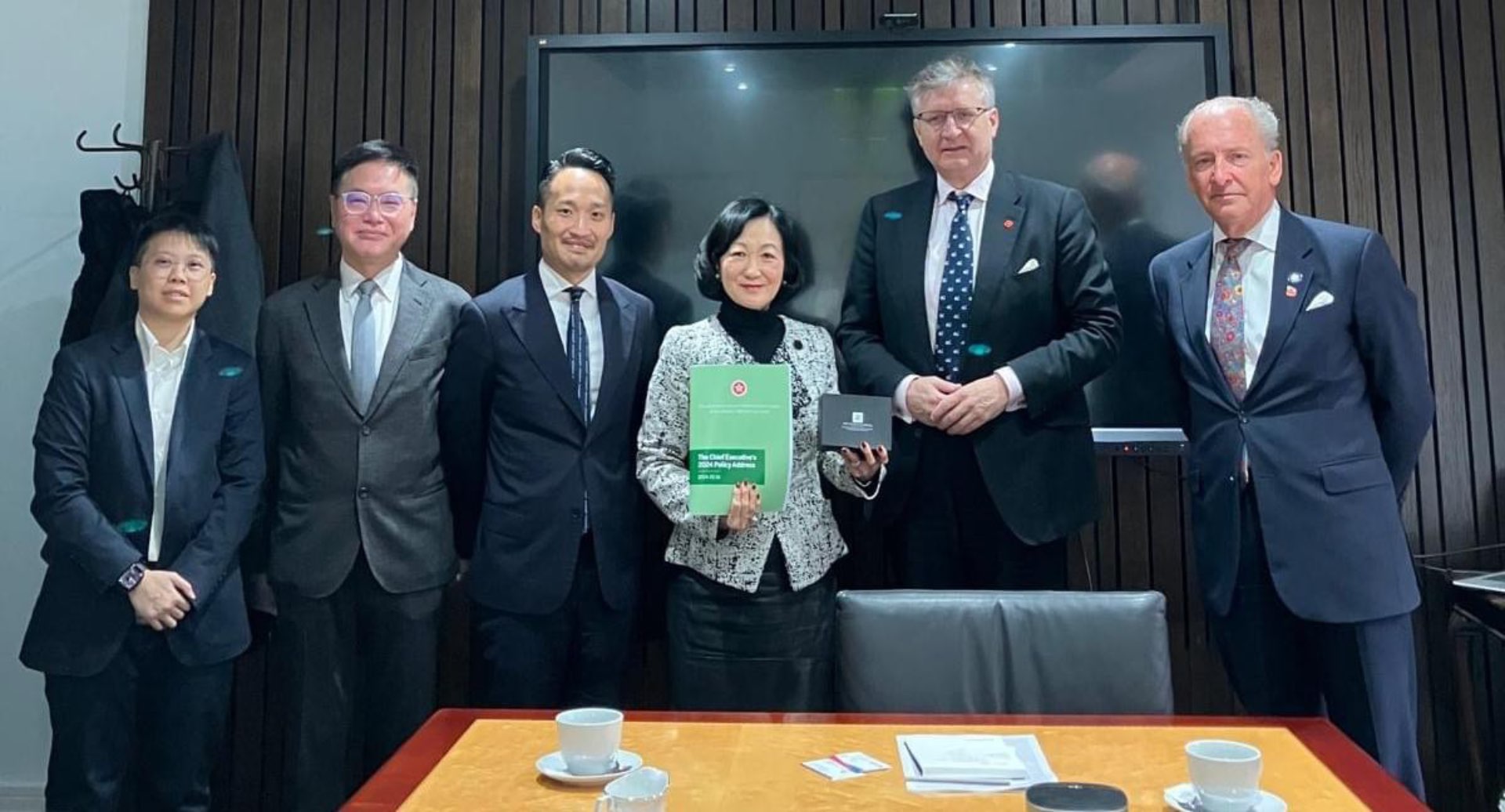
新民黨主席葉劉淑儀女士應英國政府及商界邀請,於10月30日至11月8日期間,率領新民黨「對外聯絡小組」到訪英國倫敦。訪問團成員包括新民黨中委暨立法會議員何敬康先生;新民黨執委、全國港區政協暨財政部委任諮詢專家羅卓堅太平紳士;以及新民黨政策總裁劉穎峰女士。
是次訪英行程緊密而豐富,訪問團先後與我國駐英公使、英國政府官員、智庫、政商界及傳媒會晤,向各方介紹行政長官《施政報告》的各項舉措、香港真實現況、粵港澳大灣區的發展面貌,以及有關《〈內地與香港關於建立更緊密經貿關係的安排〉服務貿易協議》(CEPA)的新修訂內容,增進各方對香港的了解,成果豐碩。
訪問團於10月31日抵達倫敦後,首先與第690屆倫敦金融城市長(Lord Mayor of the City of London) Sir Charles Bowman及第696屆倫敦金融城市長 Mr. Alderman Alastair King 會面,為是次訪問行程揭開序幕。
同日,訪問團拜訪我國駐英大使館王起公使。當日下午,葉太與英國外交聯邦及發展部政務次官 Ms. Catherine West(Parliamentary Under-Secretary of State at the Foreign, Commonwealth and Development Office)會面。
在其後的行程,葉太與英國商業貿易部(Department for Business and Trade)高級官員會面。訪問團亦拜訪了香港駐倫敦經濟貿易辦事處,處長羅莘桉先生及副處長葉昱蔚先生向葉太介紹了經貿辦的工作概況。
是次訪英,訪問團先後與兩個智庫舉行會議。訪問團首先與皇家國際事務研究所(The Royal Institute of International Affairs,即漆咸樓 Chatham House)董事兼首席執行官 Ms. Bronwen Maria Maddox、亞太項目主任 Mr. Ben Bland,以及其他代表進行會議。之後亦與另一智庫英中協會(The Great Britain-China Centre)進行會議,與董事會主席 Sir Martin Davidson、主任 Ms. Merethe Macleod,以及其他代表交流。
傳媒方面,訪問團分別與《衛報》(The Guardian)及《經濟學人》(The Economist)等傳媒的資深編輯代表會面及交流。
商界方面,訪問團與前怡和集團董事 Mr. Martin Gilbert Barrow(鮑磊)及怡和控股公司執行董事 Mr. Adam Keswick 會面。最後,訪問團獲邀出席由英中貿易協會(China Britain Business Council)主持的晚宴,與主席 Sir Sherard Louis Cowper-Coles(古沛勤)及行政總裁 Mr. Peter Burnett 等商界高層交流。
是次訪問行程進展順利,訪問團於11月8日返港。訪問團成員均對此行成果感到滿意,認為是次訪問十分有意義。今後新民黨「對外聯絡小組」會推動更多民間外交工作,加強香港的對外聯繫。
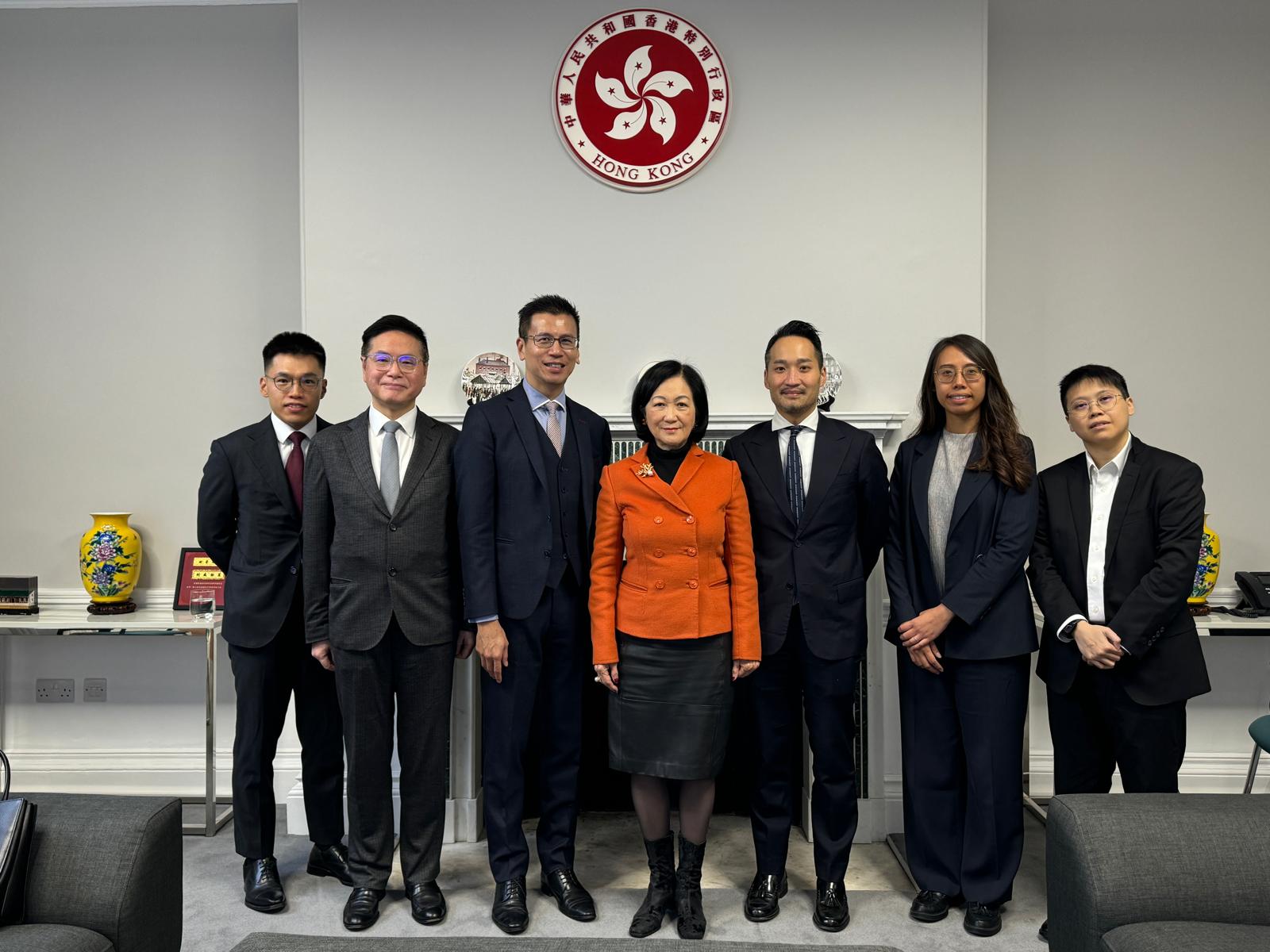
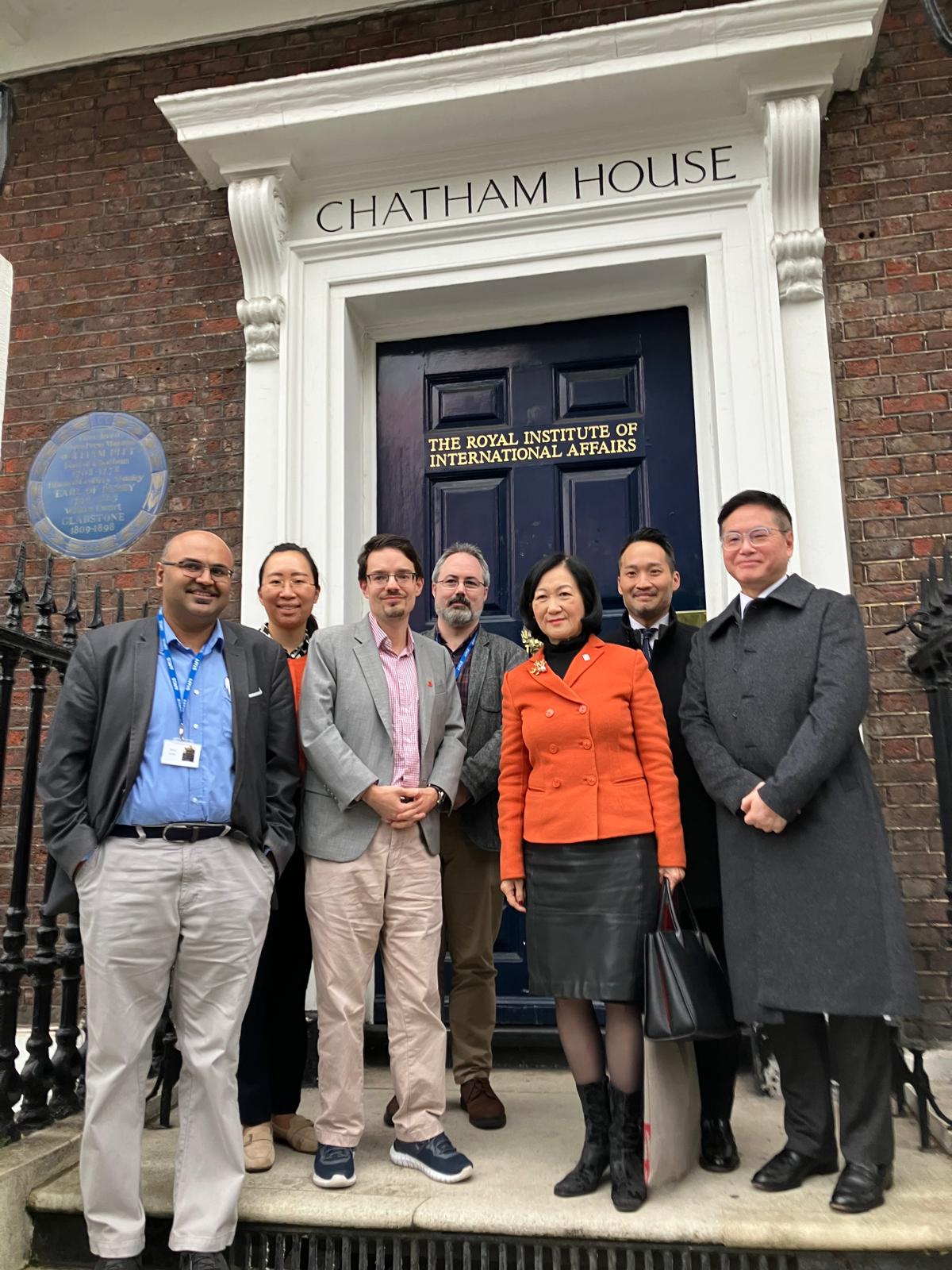
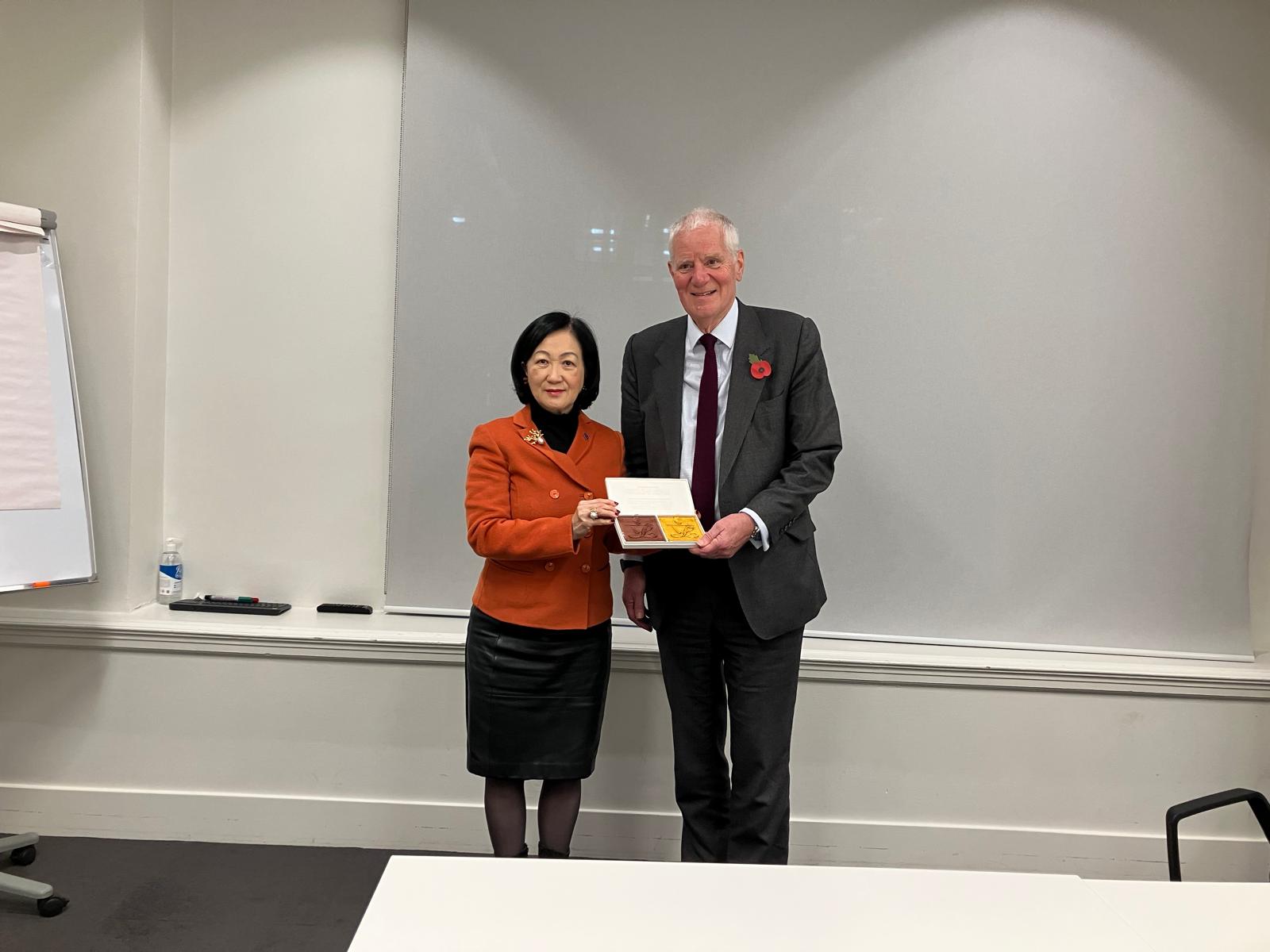
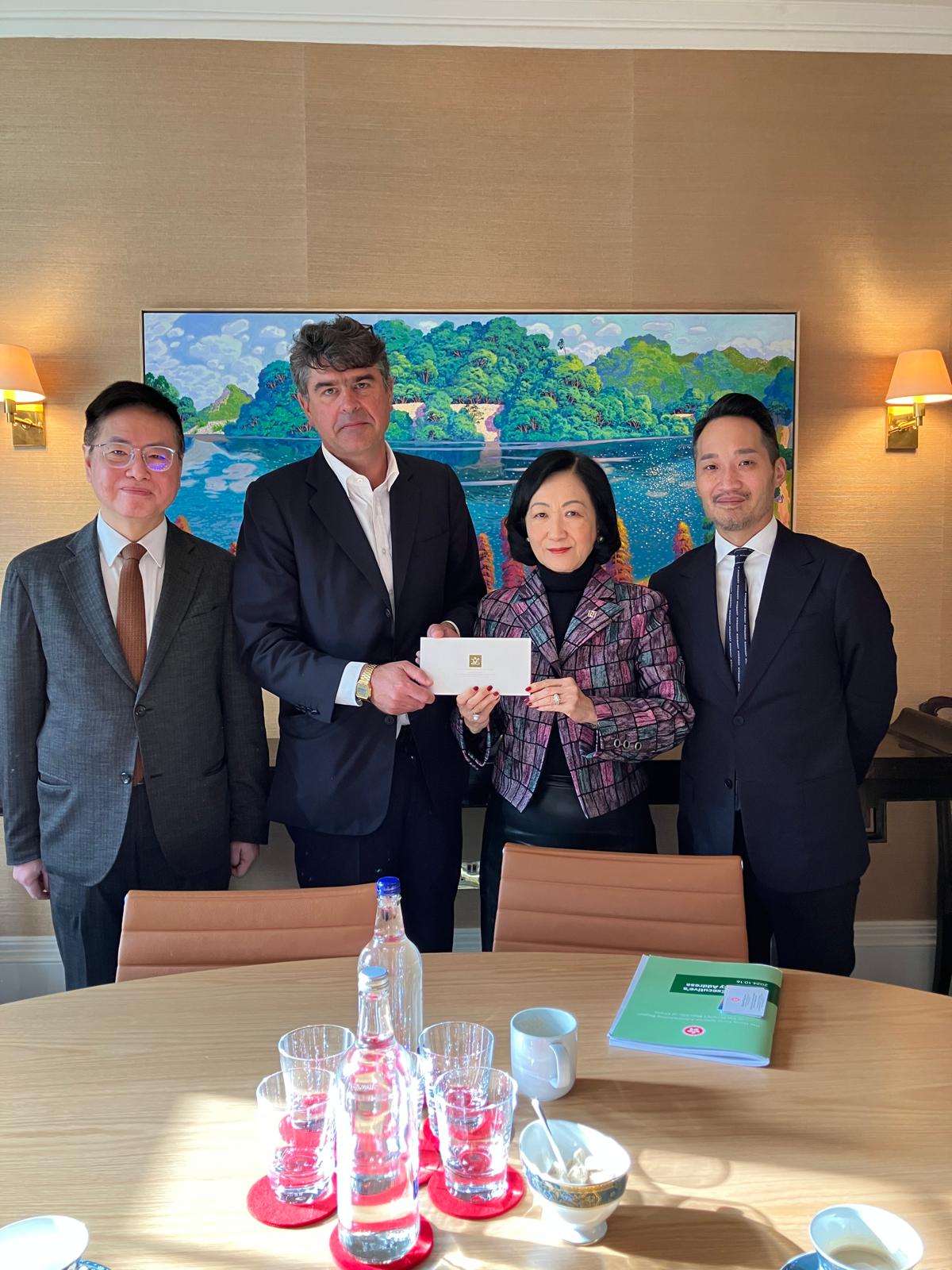
|
|
|
賀錦麗慘敗有因 / Kamala harris's Crushing Defeat
文章
![]() 美國總統大選結果塵埃落定。選舉前,不少民調認為特朗普與賀錦麗在支持度上「叮噹馬頭」,是次選舉的競爭將會異常激烈。更有人大膽預測,雙方可能因為互相指控對手選舉欺詐所引發的法律糾紛,導致選舉結果遲遲無法出爐。然而,大選最後卻以特朗普橫掃7 個搖擺州,取得312 張選舉人票,輕鬆大勝賀錦麗告終。此外,共和黨還贏得參議院的多數席位(53 對46);眾議院方面,截至11 月11 日共和黨已奪得435 席中的214 席,預料可取得眾議院控制權。美國是一個三權分立的國家:立法權力歸於國會、行政權力歸於美國總統,而美國最高法院擁有終極司法權。特朗普勝選並幫助共和黨取得兩院控制權,加上在上個任期中任命了三位保守派的最高法院大法官,使特朗普能罕有地控制「三權」,而致「三權分立」的制衡機制在未來四年失效。
據各大美媒報道,民主黨大選慘敗後,黨內各方迅速互相指摘。美國眾議院前議長佩洛西在11 月8 日的一個播客節目分析,民主黨敗選的主因在於總統拜登退選太晚,導致民主黨來不及舉行初選,以致缺乏競爭,難以選出比賀錦麗優秀的候選人。選戰的過程突顯賀錦麗是一個弱勢的候選人,演辭及辯論都經過高度排練,她在電視辯論的表現只不過是中規中矩,反映她未曾經歷真正考驗。此外,賀錦麗的政綱有着濃重的拜登影子,缺乏個人特色及魅力。比方說,賀錦麗強調婦女墮胎權,但與奧巴馬夫人米歇爾(Michelle Obama)在女權主義上的演說相比,她的演說缺乏感染力,未能如預期般贏得女性選民的廣泛支持。她的競選拍檔副總統候選人沃爾茲(Tim Walz)在面對特朗普副手萬斯(J.D. Vance)時,對於萬斯提出的許多批評和攻擊顯得缺乏準備,力有不逮。
除候選人個人的原因外,美國當前的政治經濟環境以及民主黨的選舉策略失當,亦使賀錦麗的選戰慘敗,嚴重影響民主黨未來發展。下期拆解民主黨敗選的其他原因。
Kamala harris's Crushing Defeat
The dust has settled on the results of the U.S. presidential election. Before the election, many polls indicated that Trump and Kamala harris were neck and neck in terms of support, suggesting that the competition in this election would be exceptionally fierce. Some even boldly predicted that legal disputes stemming from mutual accusations of electoral fraud could delay the election results. However, the election concluded with Trump sweeping 7 swing states, securing 312 electoral votes and easily defeating Kamala harris. Additionally, the Republican Party also won the majority of seats in the Senate (53 to 46). As of November 11th, the Republican Party has secured 214 out of 435 seats in the House of Representatives, expected to gain control of the House.
The United States is a country with a separation of powers: legislative power belongs to Congress, executive power to the President, and the Supreme Court holds ultimate judicial power. Trump's victory and the Republican Party's control of both chambers, coupled with his appointment of three conservative Supreme Court justices in the previous term, have allowed Trump to unusually control all three branches of government, rendering the system of "checks and balances" ineffective for the next four years.
According to reports from major U.S. media outlets, following the Democratic Party's disastrous defeat, various factions within the party quickly began blaming each other. Former Speaker of the House Nancy Pelosi, in a podcast on November 8th, analyzed that the main reason for the Democratic Party's defeat was Biden's late withdrawal from the race, leading to a lack of competition as the Democrats did not have enough time for primaries to select a more outstanding candidate than Kamala harris. The campaign process highlighted Kamala harris's weaknesses as a candidate; her speeches and debates were highly rehearsed, and her performance in televised debates was only average, reflecting her lack of real testing. Furthermore, Kamala harris's policy platform bore a strong resemblance to Biden's, lacking personal characteristics and charm. For example, while Kamala harris emphasized women's abortion rights, her speeches lacked the inspirational power compared to Michelle Obama's feminist speeches, failing to garner widespread support from female voters as expected. Her running mate, Vice Presidential candidate Tim Walz, appeared unprepared in facing many criticisms and attacks from Trump's running mate, J.D. Vance.
In addition to personal reasons for the candidates, the current political and economic environment in the U.S. and the Democratic Party's flawed election strategies also contributed to Kamala harris's crushing defeat, severely impacting the future development of the Democratic Party. Stay tuned for further analysis on other reasons for the Democratic Party's defeat in the next installment.
美國總統大選結果塵埃落定。選舉前,不少民調認為特朗普與賀錦麗在支持度上「叮噹馬頭」,是次選舉的競爭將會異常激烈。更有人大膽預測,雙方可能因為互相指控對手選舉欺詐所引發的法律糾紛,導致選舉結果遲遲無法出爐。然而,大選最後卻以特朗普橫掃7 個搖擺州,取得312 張選舉人票,輕鬆大勝賀錦麗告終。此外,共和黨還贏得參議院的多數席位(53 對46);眾議院方面,截至11 月11 日共和黨已奪得435 席中的214 席,預料可取得眾議院控制權。美國是一個三權分立的國家:立法權力歸於國會、行政權力歸於美國總統,而美國最高法院擁有終極司法權。特朗普勝選並幫助共和黨取得兩院控制權,加上在上個任期中任命了三位保守派的最高法院大法官,使特朗普能罕有地控制「三權」,而致「三權分立」的制衡機制在未來四年失效。
據各大美媒報道,民主黨大選慘敗後,黨內各方迅速互相指摘。美國眾議院前議長佩洛西在11 月8 日的一個播客節目分析,民主黨敗選的主因在於總統拜登退選太晚,導致民主黨來不及舉行初選,以致缺乏競爭,難以選出比賀錦麗優秀的候選人。選戰的過程突顯賀錦麗是一個弱勢的候選人,演辭及辯論都經過高度排練,她在電視辯論的表現只不過是中規中矩,反映她未曾經歷真正考驗。此外,賀錦麗的政綱有着濃重的拜登影子,缺乏個人特色及魅力。比方說,賀錦麗強調婦女墮胎權,但與奧巴馬夫人米歇爾(Michelle Obama)在女權主義上的演說相比,她的演說缺乏感染力,未能如預期般贏得女性選民的廣泛支持。她的競選拍檔副總統候選人沃爾茲(Tim Walz)在面對特朗普副手萬斯(J.D. Vance)時,對於萬斯提出的許多批評和攻擊顯得缺乏準備,力有不逮。
除候選人個人的原因外,美國當前的政治經濟環境以及民主黨的選舉策略失當,亦使賀錦麗的選戰慘敗,嚴重影響民主黨未來發展。下期拆解民主黨敗選的其他原因。
Kamala harris's Crushing Defeat
The dust has settled on the results of the U.S. presidential election. Before the election, many polls indicated that Trump and Kamala harris were neck and neck in terms of support, suggesting that the competition in this election would be exceptionally fierce. Some even boldly predicted that legal disputes stemming from mutual accusations of electoral fraud could delay the election results. However, the election concluded with Trump sweeping 7 swing states, securing 312 electoral votes and easily defeating Kamala harris. Additionally, the Republican Party also won the majority of seats in the Senate (53 to 46). As of November 11th, the Republican Party has secured 214 out of 435 seats in the House of Representatives, expected to gain control of the House.
The United States is a country with a separation of powers: legislative power belongs to Congress, executive power to the President, and the Supreme Court holds ultimate judicial power. Trump's victory and the Republican Party's control of both chambers, coupled with his appointment of three conservative Supreme Court justices in the previous term, have allowed Trump to unusually control all three branches of government, rendering the system of "checks and balances" ineffective for the next four years.
According to reports from major U.S. media outlets, following the Democratic Party's disastrous defeat, various factions within the party quickly began blaming each other. Former Speaker of the House Nancy Pelosi, in a podcast on November 8th, analyzed that the main reason for the Democratic Party's defeat was Biden's late withdrawal from the race, leading to a lack of competition as the Democrats did not have enough time for primaries to select a more outstanding candidate than Kamala harris. The campaign process highlighted Kamala harris's weaknesses as a candidate; her speeches and debates were highly rehearsed, and her performance in televised debates was only average, reflecting her lack of real testing. Furthermore, Kamala harris's policy platform bore a strong resemblance to Biden's, lacking personal characteristics and charm. For example, while Kamala harris emphasized women's abortion rights, her speeches lacked the inspirational power compared to Michelle Obama's feminist speeches, failing to garner widespread support from female voters as expected. Her running mate, Vice Presidential candidate Tim Walz, appeared unprepared in facing many criticisms and attacks from Trump's running mate, J.D. Vance.
In addition to personal reasons for the candidates, the current political and economic environment in the U.S. and the Democratic Party's flawed election strategies also contributed to Kamala harris's crushing defeat, severely impacting the future development of the Democratic Party. Stay tuned for further analysis on other reasons for the Democratic Party's defeat in the next installment.
|
|
|
混亂的美國大選 / The Chaotic U.S. Election
文章
![]() 執筆時距離11月5日舉行的美國總統大選只剩下一周時間。今次大選極具戲劇性,先有拜登因電視辯論失利而退選,賀錦麗臨危受命,後有特朗普兩度遇刺;加上目前國際形勢嚴峻,世界各國都對選舉結果翹首以盼。不過,美國的選舉制度相當複雜,有機會常令大選結果遲遲無法出爐。
美國設有聯邦選舉委員會(Federal Election Commission),但並不負責舉行或管理選舉,只負責監管競選資金的使用,舉行選舉的權力則授予各州政府。因此,每個州份的選舉及投票方式都不一樣。比方說,美國允許選民透過郵寄選票來投票,而各州郵寄投票的截郵時間各有不同,加上有部分郵寄選票會遲到,導致點票所需的時間大增。
除此以外,美國大選所採用的選舉人團制度(Electoral College)亦令選舉結果的出爐時間大幅延後。選舉之後,各州政府會根據普選結果任命選舉人(Elector)代表該州人民投票選出總統及副總統,並將選舉結果確認證書(Certificates of Vote)送至國會點算。以今年大選為例,當11月5日的普選結果出爐後,州政府最遲會到12月11日才正式任命選舉人,各州選舉人於12月17日才投票,當選者在1月20日宣誓就職,整個大選流程將長達兩個月。
美國社會近年非常撕裂,選舉期太長有機會為選舉結果帶來變數。特朗普目前官非纏身,急需總統的刑事豁免權,據悉其競選團隊已準備好在敗選州份發起訴訟,挑戰選舉結果;亦有意見指出,特朗普的選民基礎以激進的極右勢力為主,加上美國的政治暴力事件有上升趨勢,擔心特朗普敗選可能會引出另一次的「國會山莊騷亂」。除此以外,亦有不少民主黨支持者對賀錦麗目前的選情感到憂慮,若賀錦麗敗選,民主黨內部勢掀另一波信心危機。
混亂的美國大選(撰文:葉劉淑儀,原文刊於《明報》)
The Chaotic U.S. Election
With only a week remaining until the U.S. presidential election on November 5th, this election cycle is proving to be incredibly dramatic. It began with Biden dropping out due to a poor performance in a televised debate, and Harris stepping in to take his place. Trump has also been targeted for assassination twice. Coupled with the current international tensions, countries around the world are eagerly awaiting the election results. However, the U.S. election system is quite complex, often leading to delays in finalizing the election outcome.
The United States has the Federal Election Commission, which is responsible for overseeing the use of campaign funds but not for conducting or managing elections. The power to hold elections is delegated to the state governments. As a result, each state has different election and voting procedures. For example, the U.S. allows voters to cast their ballots by mail, with different states having varying deadlines for receiving mail-in votes. Some mail-in ballots may arrive late, significantly extending the time needed for counting.
Furthermore, the Electoral College system used in U.S. elections also contributes to the delayed announcement of election results. After the election, state governments appoint electors based on the popular vote results to represent the people of the state in casting votes for the President and Vice President. The election results certificates are then sent to Congress for counting. In this year's election, for instance, after the popular vote results on November 5th, state governments will appoint electors no later than December 11th, with electors casting their votes on December 17th. The winner will be inaugurated on January 20th, making the entire election process last for two months.
In recent years, American society has been deeply divided, and the lengthy election period could introduce uncertainties into the election outcome. Trump is currently facing legal challenges and is in urgent need of presidential pardons. Reports indicate that his campaign team is prepared to launch lawsuits in states where he loses, challenging the election results. Some also suggest that Trump's voter base consists mainly of radical right-wing forces, combined with the rising trend of political violence in the U.S., raising concerns that a Trump defeat could lead to another "Capitol Hill riot." Additionally, many Democratic supporters are anxious about Harris's current electoral prospects, fearing that a Harris defeat could trigger a confidence crisis within the Democratic Party.
執筆時距離11月5日舉行的美國總統大選只剩下一周時間。今次大選極具戲劇性,先有拜登因電視辯論失利而退選,賀錦麗臨危受命,後有特朗普兩度遇刺;加上目前國際形勢嚴峻,世界各國都對選舉結果翹首以盼。不過,美國的選舉制度相當複雜,有機會常令大選結果遲遲無法出爐。
美國設有聯邦選舉委員會(Federal Election Commission),但並不負責舉行或管理選舉,只負責監管競選資金的使用,舉行選舉的權力則授予各州政府。因此,每個州份的選舉及投票方式都不一樣。比方說,美國允許選民透過郵寄選票來投票,而各州郵寄投票的截郵時間各有不同,加上有部分郵寄選票會遲到,導致點票所需的時間大增。
除此以外,美國大選所採用的選舉人團制度(Electoral College)亦令選舉結果的出爐時間大幅延後。選舉之後,各州政府會根據普選結果任命選舉人(Elector)代表該州人民投票選出總統及副總統,並將選舉結果確認證書(Certificates of Vote)送至國會點算。以今年大選為例,當11月5日的普選結果出爐後,州政府最遲會到12月11日才正式任命選舉人,各州選舉人於12月17日才投票,當選者在1月20日宣誓就職,整個大選流程將長達兩個月。
美國社會近年非常撕裂,選舉期太長有機會為選舉結果帶來變數。特朗普目前官非纏身,急需總統的刑事豁免權,據悉其競選團隊已準備好在敗選州份發起訴訟,挑戰選舉結果;亦有意見指出,特朗普的選民基礎以激進的極右勢力為主,加上美國的政治暴力事件有上升趨勢,擔心特朗普敗選可能會引出另一次的「國會山莊騷亂」。除此以外,亦有不少民主黨支持者對賀錦麗目前的選情感到憂慮,若賀錦麗敗選,民主黨內部勢掀另一波信心危機。
混亂的美國大選(撰文:葉劉淑儀,原文刊於《明報》)
The Chaotic U.S. Election
With only a week remaining until the U.S. presidential election on November 5th, this election cycle is proving to be incredibly dramatic. It began with Biden dropping out due to a poor performance in a televised debate, and Harris stepping in to take his place. Trump has also been targeted for assassination twice. Coupled with the current international tensions, countries around the world are eagerly awaiting the election results. However, the U.S. election system is quite complex, often leading to delays in finalizing the election outcome.
The United States has the Federal Election Commission, which is responsible for overseeing the use of campaign funds but not for conducting or managing elections. The power to hold elections is delegated to the state governments. As a result, each state has different election and voting procedures. For example, the U.S. allows voters to cast their ballots by mail, with different states having varying deadlines for receiving mail-in votes. Some mail-in ballots may arrive late, significantly extending the time needed for counting.
Furthermore, the Electoral College system used in U.S. elections also contributes to the delayed announcement of election results. After the election, state governments appoint electors based on the popular vote results to represent the people of the state in casting votes for the President and Vice President. The election results certificates are then sent to Congress for counting. In this year's election, for instance, after the popular vote results on November 5th, state governments will appoint electors no later than December 11th, with electors casting their votes on December 17th. The winner will be inaugurated on January 20th, making the entire election process last for two months.
In recent years, American society has been deeply divided, and the lengthy election period could introduce uncertainties into the election outcome. Trump is currently facing legal challenges and is in urgent need of presidential pardons. Reports indicate that his campaign team is prepared to launch lawsuits in states where he loses, challenging the election results. Some also suggest that Trump's voter base consists mainly of radical right-wing forces, combined with the rising trend of political violence in the U.S., raising concerns that a Trump defeat could lead to another "Capitol Hill riot." Additionally, many Democratic supporters are anxious about Harris's current electoral prospects, fearing that a Harris defeat could trigger a confidence crisis within the Democratic Party.
|
|
|
發展旅遊需全盤策略 / Developing Tourism Requires a Comprehensive Strategy
文章
![]() 行政長官李家超在10月16日宣讀的新一份《施政報告》中,第六章(促進文化體育旅遊融合發展,推動多元經濟)當中有整整三大段詳述如何(增強文化自信,打造香港旅遊新面貌),提及生態旅遊、盛事旅遊、熊貓旅遊、賽馬旅遊、郵輪旅遊,以至智慧旅遊,又要推廣沙頭角文化生態旅遊路線、加快建設南大嶼生態康樂走廊和發展前南丫石礦場等等;此外又要鞏固傳統旅遊吸引力,制訂十八區美食指南,舉辦美食盛事;以做到「香港無處不旅遊」。
《施政報告》提出的旅遊項目繁多,稱得上目不暇給,反映行政長官李家超非常願意聆聽,廣納社會各界包括立法會議員、區議員和不同組織的建議;例如發展前南丫石礦場便是我和新民黨一直推動的項目。不過,要成功落實上述各個項目,有效振興旅遊業,帶動經濟效益,並非把各項建議「數白欖式」收納在《香港旅遊業發展藍圖2.0》便可,文化及體育旅遊局任重道遠,看來還有大量工作要做。
盤點旅遊資源
我認為發展旅遊需要全盤策略,一環扣一環。首先是要盤點香港有甚麼旅遊資源,包括傳統的景點、歷史名勝、主題公園、博物館、海島、生態勝地,到近期大熱的熊貓、剛出土的恐龍化石等,以至《施政報告》未有提及的紅色旅遊景點,也需羅列。
為旅遊資源下定義
第二步是要為旅遊資源下定義,界定哪些旅遊資源能吸引哪些遊客。舉例說,我認為熊貓對東南亞或海外旅客吸引力較大,但是熊貓對內地旅客而言並不罕見,他們未必熱衷為熊貓來港,反而港人特別是小朋友會對一對在香港出生的熊貓有共生情懷。
內地旅客期望來香港體驗內地沒有的東西,他們喜歡迪士尼樂園,認為「港迪」貼近美國迪士尼的風味。小紅書上常常有「港迪」帖子,「港迪」能逆市加價,成人票價近千元,可見其受歡迎程度。
此外,西九文化區香港故宮文化博物館和M+博物館各類藝術文化、古物展覽會比較吸引中產和高端旅客;相對地,分散各區的網紅打卡點則較吸引喜歡四處遊走的年輕人。
針對性優化配置
明確了不同旅遊資源的屬性後,第三步便要針對性地優化配置,開拓市場;特別是要認清,若低端市場難以和內地比拼,我們便要鞏固高端市場,提供優質服務和消費體驗,提升競爭力。《施政報告》提到要「開拓中東和東盟旅客客源」,那麼便需要增加高端清真食肆以及禮拜設施,我認為方向正確。
近期全城熱切期待啟德體育園開幕和COLDPLAY演唱會帶來的盛事效應,又有點憂慮屆時能否順利疏導五萬人潮,及早部署及演練交通安排便成關鍵。我一直推動在港舉辦「一帶一路運動會」,若能成事,務必有不同國家的運動員、團隊及旅客來港,做好啟德體育園的配套便是為體育旅遊做好準備。
策略性宣傳營銷
第四步也是關鍵一步,有別於千篇一律的廣泛營銷,特區政府需要基於以上三步曲的分析,思考如何策略性地宣傳營銷,準確地把香港不同切面的旅遊特性,針對性地推廣予特定旅客群,開拓市場。當然也要根據不同目標旅客群的特性喜好而採取不同的宣傳方式,傳統廣告抑或社交平台、明星代言抑或素人帖文,各有功能,要運用得宜才能發揮神效。
分層出擊提升旅遊競爭力
的而且確,香港正經歷通縮期。很多食肆不惜推出「傷本」優惠,酒店自助餐大擘價,不乏「買一送一」、「買二送四」,最近更有粥店推出「十蚊任食放題」,大家都忙於自救,反映特區政府有必要加快步伐,提振經濟。
最後,我認為特區政府必須認清,香港旅遊業復甦緩慢的一大原因在於消費物價高昂,與臨近地區相比缺乏競爭力。物價高低主要取決於商品的國際價格,而國際價格又等於本地價格乘聯繫匯率;若聯繫匯率不變,本地價格一定要變,出現通縮便無可避免。理論上,若價格下跌,旅遊會復甦;特別是美國減息,港元轉弱;若迎來真正的減息周期,港元會稍為逆轉,國際旅遊會慢慢恢復。
此時此刻,特區政府必須好好把握自己的優勢,規劃全盤策略,分層出擊,提升旅遊競爭力。若只是將坊間意見照單全收,《香港旅遊業發展藍圖2.0》將事倍功半。
Developing Tourism Requires a Comprehensive Strategy
In the new "Policy Address" announced by Chief Executive Li Ka-chiu on October 16th, Chapter Six (Promoting the Integrated Development of Cultural, Sports, and Tourism to Drive Diverse Economy) includes three detailed sections on how to enhance cultural confidence and create a new face for tourism in Hong Kong.
The report mentions ecotourism, major events tourism, panda tourism, horse racing tourism, cruise tourism, and smart tourism. It also emphasizes the promotion of cultural and ecological tourism routes in Sha Tau Kok, accelerating the construction of the Southern Lantau Ecological Leisure Corridor, and developing the former South Lamma Quarry, among others. Additionally, it aims to strengthen traditional tourism attractions by creating an 18-district gourmet guide, hosting food festivals, and ensuring that "there is no place in Hong Kong without tourism."
"The Policy Address" proposes a multitude of tourism projects, which can be described as overwhelming. This reflects Chief Executive Li Ka-chao's willingness to listen attentively and widely solicit suggestions from various sectors of society, including Legislative Council members, district councilors, and various organizations. For example, the development of the former South Lamma Quarry is a project that I and the New Democratic Party have been advocating for. However, successfully implementing these various projects to effectively revitalize the tourism industry, drive economic benefits, is not simply a matter of incorporating all suggestions in the "Hong Kong Tourism Development Blueprint 2.0" in a perfunctory manner. The road ahead for the Cultural and Sports Tourism Bureau is long and arduous, indicating that there is still a significant amount of work to be done.
Inventory of Tourism Resources
I believe that developing tourism requires a comprehensive strategy, with each aspect interconnected. The first step is to take stock of what tourism resources Hong Kong has, including traditional attractions, historical landmarks, theme parks, museums, islands, ecological sites, as well as recently popular attractions like pandas, newly discovered dinosaur fossils, and even red tourism sites not mentioned in "The Policy Address."
Defining Tourism Resources
The second step is to define tourism resources, determining which resources can attract which types of tourists. For example, I believe that pandas have a greater appeal to tourists from Southeast Asia or overseas, but they are not as rare for mainland Chinese tourists, who may not be as enthusiastic about coming to Hong Kong specifically for pandas. On the other hand, Hong Kong residents, especially children, may have a special affinity for pandas born in Hong Kong.
Mainland Chinese tourists expect to experience things in Hong Kong that they cannot find on the mainland. They enjoy Disneyland, considering "Hong Kong Disneyland" to be reminiscent of the American Disney flavor. Posts about "Hong Kong Disneyland" are frequently seen on Xiaohongshu (Little Red Book), and "Hong Kong Disneyland" can command higher prices against the market trend, with adult ticket prices close to a thousand Hong Kong dollars, indicating its popularity.
Furthermore, cultural attractions like the Hong Kong Palace Museum and M+ Museum in the West Kowloon Cultural District appeal more to middle-class and high-end tourists. Conversely, Instagrammable spots scattered throughout various districts are more appealing to young people who enjoy exploring different areas.
Targeted Optimization and Allocation
Once the attributes of different tourism resources are clearly defined, the third step is to optimize and allocate resources accordingly to expand the market. It is crucial to recognize that if it is challenging to compete with the mainland in the low-end market, we should consolidate the high-end market by providing high-quality services and consumer experiences to enhance competitiveness. The Policy Address mentions the need to "develop tourist sources from the Middle East and ASEAN," which requires an increase in high-end halal restaurants and prayer facilities. I believe this direction is correct.
The highly anticipated opening of the Kai Tak Sports Park and the event impact brought by the COLDPLAY concert have generated citywide excitement. However, there are concerns about whether we can efficiently manage the anticipated fifty thousand attendees and the importance of early deployment and rehearsal of traffic arrangements is crucial. I have been advocating for hosting the "Belt and Road Games" in Hong Kong. If successful, athletes, teams, and tourists from different countries will surely come to Hong Kong. Proper preparation at the Kai Tak Sports Park will be essential for sports tourism.
Strategic Promotion and Marketing
The fourth step is also a critical one. In contrast to generic widespread marketing, the SAR government needs to think strategically about how to promote and market based on the analysis of the previous three steps. It is essential to accurately promote the diverse tourism characteristics of Hong Kong to specific target groups and expand the market strategically. Additionally, different promotional methods should be employed based on the preferences of the target tourist groups. Traditional advertising, social media platforms, celebrity endorsements, or user-generated content all have their unique functions, and utilizing them appropriately can yield significant results.
Hierarchical Approach to Enhancing Tourism Competitiveness
It is evident that Hong Kong is currently experiencing a period of deflation. Many eateries are offering loss-making promotions, hotels are slashing buffet prices, with deals like "buy one get one free" or "buy two get four free." Recently, a congee shop even introduced a "all-you-can-eat for $10" promotion. Everyone is busy trying to save themselves, reflecting the urgent need for the SAR government to accelerate its pace and boost the economy.
Finally, I believe the SAR government must recognize that one major reason for the slow recovery of the Hong Kong tourism industry is the high cost of living, which lacks competitiveness compared to neighboring regions. The price level primarily depends on the international prices of goods, which in turn equals the local price multiplied by the linked exchange rate. If the linked exchange rate remains unchanged, local prices must adjust, leading to deflation. In theory, if prices fall, tourism will recover, especially if the US cuts interest rates and the Hong Kong dollar weakens. If a genuine interest rate cut cycle arrives, the Hong Kong dollar will slightly reverse, and international tourism will gradually recover.
At this moment, the SAR government must leverage its advantages, plan a comprehensive strategy, adopt a hierarchical approach, and enhance tourism competitiveness. Simply accepting all opinions without a structured plan will result in only half-hearted efforts in the "Development Blueprint for Hong Kong's Tourism Industry 2.0"
行政長官李家超在10月16日宣讀的新一份《施政報告》中,第六章(促進文化體育旅遊融合發展,推動多元經濟)當中有整整三大段詳述如何(增強文化自信,打造香港旅遊新面貌),提及生態旅遊、盛事旅遊、熊貓旅遊、賽馬旅遊、郵輪旅遊,以至智慧旅遊,又要推廣沙頭角文化生態旅遊路線、加快建設南大嶼生態康樂走廊和發展前南丫石礦場等等;此外又要鞏固傳統旅遊吸引力,制訂十八區美食指南,舉辦美食盛事;以做到「香港無處不旅遊」。
《施政報告》提出的旅遊項目繁多,稱得上目不暇給,反映行政長官李家超非常願意聆聽,廣納社會各界包括立法會議員、區議員和不同組織的建議;例如發展前南丫石礦場便是我和新民黨一直推動的項目。不過,要成功落實上述各個項目,有效振興旅遊業,帶動經濟效益,並非把各項建議「數白欖式」收納在《香港旅遊業發展藍圖2.0》便可,文化及體育旅遊局任重道遠,看來還有大量工作要做。
盤點旅遊資源
我認為發展旅遊需要全盤策略,一環扣一環。首先是要盤點香港有甚麼旅遊資源,包括傳統的景點、歷史名勝、主題公園、博物館、海島、生態勝地,到近期大熱的熊貓、剛出土的恐龍化石等,以至《施政報告》未有提及的紅色旅遊景點,也需羅列。
為旅遊資源下定義
第二步是要為旅遊資源下定義,界定哪些旅遊資源能吸引哪些遊客。舉例說,我認為熊貓對東南亞或海外旅客吸引力較大,但是熊貓對內地旅客而言並不罕見,他們未必熱衷為熊貓來港,反而港人特別是小朋友會對一對在香港出生的熊貓有共生情懷。
內地旅客期望來香港體驗內地沒有的東西,他們喜歡迪士尼樂園,認為「港迪」貼近美國迪士尼的風味。小紅書上常常有「港迪」帖子,「港迪」能逆市加價,成人票價近千元,可見其受歡迎程度。
此外,西九文化區香港故宮文化博物館和M+博物館各類藝術文化、古物展覽會比較吸引中產和高端旅客;相對地,分散各區的網紅打卡點則較吸引喜歡四處遊走的年輕人。
針對性優化配置
明確了不同旅遊資源的屬性後,第三步便要針對性地優化配置,開拓市場;特別是要認清,若低端市場難以和內地比拼,我們便要鞏固高端市場,提供優質服務和消費體驗,提升競爭力。《施政報告》提到要「開拓中東和東盟旅客客源」,那麼便需要增加高端清真食肆以及禮拜設施,我認為方向正確。
近期全城熱切期待啟德體育園開幕和COLDPLAY演唱會帶來的盛事效應,又有點憂慮屆時能否順利疏導五萬人潮,及早部署及演練交通安排便成關鍵。我一直推動在港舉辦「一帶一路運動會」,若能成事,務必有不同國家的運動員、團隊及旅客來港,做好啟德體育園的配套便是為體育旅遊做好準備。
策略性宣傳營銷
第四步也是關鍵一步,有別於千篇一律的廣泛營銷,特區政府需要基於以上三步曲的分析,思考如何策略性地宣傳營銷,準確地把香港不同切面的旅遊特性,針對性地推廣予特定旅客群,開拓市場。當然也要根據不同目標旅客群的特性喜好而採取不同的宣傳方式,傳統廣告抑或社交平台、明星代言抑或素人帖文,各有功能,要運用得宜才能發揮神效。
分層出擊提升旅遊競爭力
的而且確,香港正經歷通縮期。很多食肆不惜推出「傷本」優惠,酒店自助餐大擘價,不乏「買一送一」、「買二送四」,最近更有粥店推出「十蚊任食放題」,大家都忙於自救,反映特區政府有必要加快步伐,提振經濟。
最後,我認為特區政府必須認清,香港旅遊業復甦緩慢的一大原因在於消費物價高昂,與臨近地區相比缺乏競爭力。物價高低主要取決於商品的國際價格,而國際價格又等於本地價格乘聯繫匯率;若聯繫匯率不變,本地價格一定要變,出現通縮便無可避免。理論上,若價格下跌,旅遊會復甦;特別是美國減息,港元轉弱;若迎來真正的減息周期,港元會稍為逆轉,國際旅遊會慢慢恢復。
此時此刻,特區政府必須好好把握自己的優勢,規劃全盤策略,分層出擊,提升旅遊競爭力。若只是將坊間意見照單全收,《香港旅遊業發展藍圖2.0》將事倍功半。
Developing Tourism Requires a Comprehensive Strategy
In the new "Policy Address" announced by Chief Executive Li Ka-chiu on October 16th, Chapter Six (Promoting the Integrated Development of Cultural, Sports, and Tourism to Drive Diverse Economy) includes three detailed sections on how to enhance cultural confidence and create a new face for tourism in Hong Kong.
The report mentions ecotourism, major events tourism, panda tourism, horse racing tourism, cruise tourism, and smart tourism. It also emphasizes the promotion of cultural and ecological tourism routes in Sha Tau Kok, accelerating the construction of the Southern Lantau Ecological Leisure Corridor, and developing the former South Lamma Quarry, among others. Additionally, it aims to strengthen traditional tourism attractions by creating an 18-district gourmet guide, hosting food festivals, and ensuring that "there is no place in Hong Kong without tourism."
"The Policy Address" proposes a multitude of tourism projects, which can be described as overwhelming. This reflects Chief Executive Li Ka-chao's willingness to listen attentively and widely solicit suggestions from various sectors of society, including Legislative Council members, district councilors, and various organizations. For example, the development of the former South Lamma Quarry is a project that I and the New Democratic Party have been advocating for. However, successfully implementing these various projects to effectively revitalize the tourism industry, drive economic benefits, is not simply a matter of incorporating all suggestions in the "Hong Kong Tourism Development Blueprint 2.0" in a perfunctory manner. The road ahead for the Cultural and Sports Tourism Bureau is long and arduous, indicating that there is still a significant amount of work to be done.
Inventory of Tourism Resources
I believe that developing tourism requires a comprehensive strategy, with each aspect interconnected. The first step is to take stock of what tourism resources Hong Kong has, including traditional attractions, historical landmarks, theme parks, museums, islands, ecological sites, as well as recently popular attractions like pandas, newly discovered dinosaur fossils, and even red tourism sites not mentioned in "The Policy Address."
Defining Tourism Resources
The second step is to define tourism resources, determining which resources can attract which types of tourists. For example, I believe that pandas have a greater appeal to tourists from Southeast Asia or overseas, but they are not as rare for mainland Chinese tourists, who may not be as enthusiastic about coming to Hong Kong specifically for pandas. On the other hand, Hong Kong residents, especially children, may have a special affinity for pandas born in Hong Kong.
Mainland Chinese tourists expect to experience things in Hong Kong that they cannot find on the mainland. They enjoy Disneyland, considering "Hong Kong Disneyland" to be reminiscent of the American Disney flavor. Posts about "Hong Kong Disneyland" are frequently seen on Xiaohongshu (Little Red Book), and "Hong Kong Disneyland" can command higher prices against the market trend, with adult ticket prices close to a thousand Hong Kong dollars, indicating its popularity.
Furthermore, cultural attractions like the Hong Kong Palace Museum and M+ Museum in the West Kowloon Cultural District appeal more to middle-class and high-end tourists. Conversely, Instagrammable spots scattered throughout various districts are more appealing to young people who enjoy exploring different areas.
Targeted Optimization and Allocation
Once the attributes of different tourism resources are clearly defined, the third step is to optimize and allocate resources accordingly to expand the market. It is crucial to recognize that if it is challenging to compete with the mainland in the low-end market, we should consolidate the high-end market by providing high-quality services and consumer experiences to enhance competitiveness. The Policy Address mentions the need to "develop tourist sources from the Middle East and ASEAN," which requires an increase in high-end halal restaurants and prayer facilities. I believe this direction is correct.
The highly anticipated opening of the Kai Tak Sports Park and the event impact brought by the COLDPLAY concert have generated citywide excitement. However, there are concerns about whether we can efficiently manage the anticipated fifty thousand attendees and the importance of early deployment and rehearsal of traffic arrangements is crucial. I have been advocating for hosting the "Belt and Road Games" in Hong Kong. If successful, athletes, teams, and tourists from different countries will surely come to Hong Kong. Proper preparation at the Kai Tak Sports Park will be essential for sports tourism.
Strategic Promotion and Marketing
The fourth step is also a critical one. In contrast to generic widespread marketing, the SAR government needs to think strategically about how to promote and market based on the analysis of the previous three steps. It is essential to accurately promote the diverse tourism characteristics of Hong Kong to specific target groups and expand the market strategically. Additionally, different promotional methods should be employed based on the preferences of the target tourist groups. Traditional advertising, social media platforms, celebrity endorsements, or user-generated content all have their unique functions, and utilizing them appropriately can yield significant results.
Hierarchical Approach to Enhancing Tourism Competitiveness
It is evident that Hong Kong is currently experiencing a period of deflation. Many eateries are offering loss-making promotions, hotels are slashing buffet prices, with deals like "buy one get one free" or "buy two get four free." Recently, a congee shop even introduced a "all-you-can-eat for $10" promotion. Everyone is busy trying to save themselves, reflecting the urgent need for the SAR government to accelerate its pace and boost the economy.
Finally, I believe the SAR government must recognize that one major reason for the slow recovery of the Hong Kong tourism industry is the high cost of living, which lacks competitiveness compared to neighboring regions. The price level primarily depends on the international prices of goods, which in turn equals the local price multiplied by the linked exchange rate. If the linked exchange rate remains unchanged, local prices must adjust, leading to deflation. In theory, if prices fall, tourism will recover, especially if the US cuts interest rates and the Hong Kong dollar weakens. If a genuine interest rate cut cycle arrives, the Hong Kong dollar will slightly reverse, and international tourism will gradually recover.
At this moment, the SAR government must leverage its advantages, plan a comprehensive strategy, adopt a hierarchical approach, and enhance tourism competitiveness. Simply accepting all opinions without a structured plan will result in only half-hearted efforts in the "Development Blueprint for Hong Kong's Tourism Industry 2.0"
|
|


